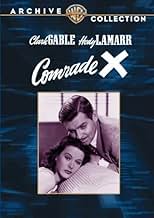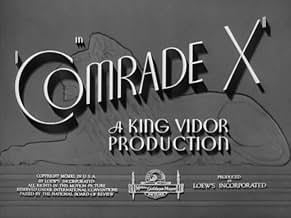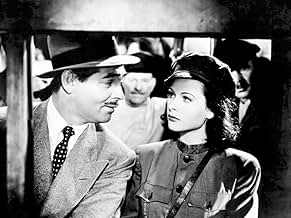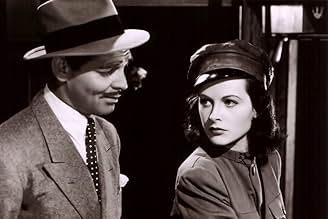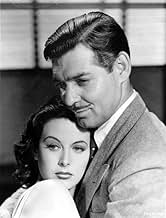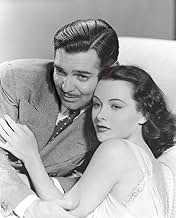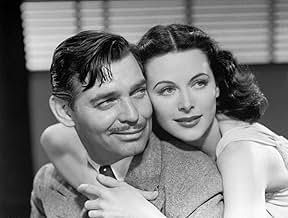IMDb रेटिंग
6.6/10
1.9 हज़ार
आपकी रेटिंग
अपनी भाषा में प्लॉट जोड़ेंAn American reporter smuggling news out of Soviet Moscow is blackmailed into helping a beautiful Communist leave the country.An American reporter smuggling news out of Soviet Moscow is blackmailed into helping a beautiful Communist leave the country.An American reporter smuggling news out of Soviet Moscow is blackmailed into helping a beautiful Communist leave the country.
- 1 ऑस्कर के लिए नामांकित
- कुल 1 नामांकन
Sig Ruman
- Emil Von Hofer
- (as Sig Rumann)
Georges Renavent
- Laszlo
- (as George Renevant)
Ed Agresti
- Press Correspondent
- (बिना क्रेडिट के)
Alexander Asro
- Russian Waiter
- (बिना क्रेडिट के)
William Bailey
- Press Correspondent
- (बिना क्रेडिट के)
Al Bain
- Marriage Bureau Customer
- (बिना क्रेडिट के)
Lici Balla
- Russian Woman
- (बिना क्रेडिट के)
Leon Belasco
- Comrade Baronoff - Hotel Manager
- (बिना क्रेडिट के)
John Bleifer
- Russian Marriage License Clerk
- (बिना क्रेडिट के)
- …
फ़ीचर्ड समीक्षाएं
I came in on "Comrade X" during the climatic tank chase scene. I don't know about the film as a whole, but the tank scene was wonderfully done. If it were done today it wouldn't be all that impressive. You'd be like "Hmmm, nice computer work!" But in 1940 it had to be done with actual existing props. So what you have is a swarm of "real" tanks chasing Gable's tank. On command they all stop, spin about and race in the opposite direction. Excellent cartoon like direction and fantastic execution of that direction. If you're a fan of cartoon like sequences done as live action then this film, or at least the final sequences thereof, are for you. Someone just tell me how they did this back in '40! One of the finest examples I can think of a great bit of work stuck somewhere in an almost forgotten film.
I did go back and research the special effects for this film. They were done by none other than A. Arnold Gillespie who won four Academy Awards out of thirteen nominations. Besides "Comrade X", he worked on such little films like "The Wizard of Oz" and "Ben-Hur". As for "Comrade X" a true case of an industry giant being handed what had to be a small assignment considering his considerable talents. The studio system works!
I did go back and research the special effects for this film. They were done by none other than A. Arnold Gillespie who won four Academy Awards out of thirteen nominations. Besides "Comrade X", he worked on such little films like "The Wizard of Oz" and "Ben-Hur". As for "Comrade X" a true case of an industry giant being handed what had to be a small assignment considering his considerable talents. The studio system works!
Clark Gable was mostly known for his he-man; lady-killer roles but he did some excellent comedy and this movie is a little-known gem. There were some great lines, too. "Well, there's some good news and some bad news. Last week all the towels were stolen. But on the other hand the water wasn't running so nobody needed the towels. Everything balances." And "Communists have ideas, but they found out you can't run a government with everybody running around having ideas". That's actually pretty true, too! People in government with "ideas" are the bane of ANY country. Loved the scene at the cemetery where the funeral procession passes by a podium carrying a coffin on its shoulders and suddenly the "corpse" sticks his head & hand out of the coffin and takes a shot at a political enemy. Curiously, the movie predicts Germany declaring war on Russia. Which in fact happened shortly after the film came out.
Funny movie - the "Kaputski Cemetery"? Excellent!!!!
Funny movie - the "Kaputski Cemetery"? Excellent!!!!
CLARK GABLE and HEDY LAMARR share the screen in a romantic comedy along the lines of "Ninotchka", which made such a success for Greta Garbo. Obviously, Louis B. Mayer hoped COMRADE X would do for Hedy what the other film did for Garbo's image--and to some extent, it did.
It's not as sophisticated and witty as the Garbo film, but Hedy plays a dedicated Soviet woman who thinks that an American that she is attracted to (CLARK GABLE) shares the same philosophy. FELIX BRESSART is her scatterbrained father, EVE ARDEN is an American newspaper woman and SIG RUMAN is a loyal Nazi foreign correspondent in Russia who is just as confused as everyone else as to the identity of "Comrade X".
It's a good role for Hedy, playing her role very much the way Cyd Charisse played the Russian gal in "Silk Stockings", and with a comic flair that she seldom exhibited in any of her MGM films, even the so-called comedies. Gable is more or less himself as the cynical newspaper man who ends up taking his bride (Lamarr) to America after they've had a few escapades that have the Soviet authorities chasing them all over the hillsides in tanks--the film's most amusing moments.
One of the funniest performances comes from NATASHA LYTESS, as Olga, a secretary who tells Gable she's a spy. Her drunken antics are a highlight (she can't see a thing without her glasses). Lytess was Marilyn Monroe's acting coach for several years, the superstar being dependent on her for her every move during her early films at Fox.
It's not as sophisticated and witty as the Garbo film, but Hedy plays a dedicated Soviet woman who thinks that an American that she is attracted to (CLARK GABLE) shares the same philosophy. FELIX BRESSART is her scatterbrained father, EVE ARDEN is an American newspaper woman and SIG RUMAN is a loyal Nazi foreign correspondent in Russia who is just as confused as everyone else as to the identity of "Comrade X".
It's a good role for Hedy, playing her role very much the way Cyd Charisse played the Russian gal in "Silk Stockings", and with a comic flair that she seldom exhibited in any of her MGM films, even the so-called comedies. Gable is more or less himself as the cynical newspaper man who ends up taking his bride (Lamarr) to America after they've had a few escapades that have the Soviet authorities chasing them all over the hillsides in tanks--the film's most amusing moments.
One of the funniest performances comes from NATASHA LYTESS, as Olga, a secretary who tells Gable she's a spy. Her drunken antics are a highlight (she can't see a thing without her glasses). Lytess was Marilyn Monroe's acting coach for several years, the superstar being dependent on her for her every move during her early films at Fox.
Who would have guessed that the usually wooden but dazzlingly beautiful Hedy Lamarr could be so delightfully funny, adorable and charming as she is in this Ninotchka role. It's a pity that she was rarely --if ever again-- given another opportunity to play this sort of anything-goes screwball comedy. Hedy here is as real and believable as Carole Lombard at her best. The script written by Ben Hecht ("Nothing Sacred"), Charlie Lederer ("The Front Page" screenplay) and the uncredited Herman Mankiewicz ("Citizen Kane") is a bizarre hard-boiled political satire ending with a lengthy and totally absurd slapstick Russian tank chase through the woods and across the river into Rumania. It looks as if it came straight out of a Max Sennett movie. Gable is his usual tough and handsome self, wonderfully adept with the throw-away gags he is given. The rest of the cast is rounded out with some of the best European character actors then living in Hollywood --the Germans Sig Ruman, Felix Bressart and the Viennese Oskar Homoloka- all playing Russians and Germans. As an added bonus there is the first on-screen appearance by the rarely seen Berlin-born actress, Natasha Lytess ("Olga"), best remembered now as Marilyn Monroe's first acting coach way before her Lee Strasberg days.
Ernst Lubtisch's classic comic statement about Communist Russia, NINOTCHKA, came out in 1939. Whether it "influenced" the production (also by MGM) of COMRADE X or not I could not say. Certainly there are similarities between the comedies. Lubitsch set his comedy in Paris, where a Communist trade mission is living it up, being corrupted by an émigré Russian noble (Melvin Douglas) so he can try to retrieve jewelry that the trade mission is using as collateral. The Russian government does not trust the three men sent, so they send a fiercer ideologue (Greta Garbo in the title role) who starts straightening out the mission, until she falls for Douglas's charm. In the end she is lured back (with her three associates) to the west and away from the Soviet paradise.
NINOTCHKA had Felix Bressart and Sig Ruman in the cast as two of the members of the trade mission. Comments on this thread point out that in the 1930s "accents" were fairly interchangeable in Hollywood, so that the Swedish Garbo (and later the Austrian Lamarr) became Russian. So did German Ruman and German - Jewish Bressart (who would also play a Hungarian in THE SHOP AROUND THE CORNER).
Unlike NINOTCHKA, COMRADE X is set inside that nightmare land, Stalinist Russia. Somebody is sending out unofficial (but thoroughly correct) news stories showing the crimes being committed in Russian by the government against the people (i.e. the purges), as well as the idiotic projects and waste mismanagement illustrative of how poorly the government is as effective government. This is being resented by the Presidium, who is represented by Oscar Homlolka (Commissar Vasiliev). Please note that Homolka's make-up makes him look a tremendous bit like one Joseph Stalin. At a public funeral covered by the press court, someone tries to shoot Vasiliev (who does all he can to hide the assassination plot). Mac Thompson (Clark Gable), the American reporter, manages to snap a photo of an odd site - a bearded man who a moment before the shooting opened up the lid of the coffin and popped out. This bearded gentlemen turns out to be one Michael Bastakoff (Vladimir Sokoloff), a rival of Vasiliev for power. He is made to look a tremendous bit like one Leon Trotsky.
Get the message from Hollywood here? Vasiliev's agents have been trying to pin down the news leaks, and has narrowed it to two figures: Thompson, and one Emil Von Hofer (Sig Ruman) who is the news representative from Nazi Germany. Ruman manages to demonstrate it ain't him, so (despite Gable's breezy denials) Vasiliev believes it is the American.
Gable has a close friend in Moscow, one Ygor Yahupitz (Felix Bressart) who is his sometimes valet. Ygor's daughter is Galubcha (Hedy Lamarr) who is a streetcar operator. Ygor wants Gable to try to smuggle Galubcha out of the Soviet Union into the U.S. And the film shows (among other things, including overcoming Galubcha's fierce belief in the Communist ideal) Gable eventually saving both the girl and her father.
The comedy is quite amusing, even if it lacks the style and grace of the Lubitsch touch of the first film. But it certainly comments on the atmosphere within Russia in a way that NINOTCHKA failed to do so. The centering of the comedy in Moscow, the suggestiveness of a Stalin - Trotsky rivalry clone, and the heavy control over information is certainly more realistic than Douglas' being elegant and eloquent about the beauties of Paris.
One more thing to keep in mind is a scandal which is on target with this film, and which (in 1940) finally began to raise eyebrows. In the early 1930s the New York Times had a reporter named Walter Duranty in Moscow. He turned out to be a fantastically well informed reporter in the Soviet Union, and came out with interviews and articles that were tremendously informative. In fact, he would win the Pulitzer Prize for his reporting from Moscow. But as time passed, Duranty's methods and sources were heavily questioned. He also tended to take an official line about the Purge Trials (i.e., that Bukhanin, Radek, Zinoviev, Tuchochevsky, and the other hundreds and thousands of victims were all actual traitors against the Stalinist regime). After the signing of the non-aggression pact with Germany in 1939, the Times became very suspicious of Duranty, and replaced him. The quality of the articles became very much more even handed. Duranty was later revealed to be a Stalinist agent. Interestingly enough, the Pulitzer Committee has repeatedly rejected requests to take back their award from Duranty's heirs as his work was pure propaganda. So the issue about the control over the news from Russia was very, very real.
NINOTCHKA had Felix Bressart and Sig Ruman in the cast as two of the members of the trade mission. Comments on this thread point out that in the 1930s "accents" were fairly interchangeable in Hollywood, so that the Swedish Garbo (and later the Austrian Lamarr) became Russian. So did German Ruman and German - Jewish Bressart (who would also play a Hungarian in THE SHOP AROUND THE CORNER).
Unlike NINOTCHKA, COMRADE X is set inside that nightmare land, Stalinist Russia. Somebody is sending out unofficial (but thoroughly correct) news stories showing the crimes being committed in Russian by the government against the people (i.e. the purges), as well as the idiotic projects and waste mismanagement illustrative of how poorly the government is as effective government. This is being resented by the Presidium, who is represented by Oscar Homlolka (Commissar Vasiliev). Please note that Homolka's make-up makes him look a tremendous bit like one Joseph Stalin. At a public funeral covered by the press court, someone tries to shoot Vasiliev (who does all he can to hide the assassination plot). Mac Thompson (Clark Gable), the American reporter, manages to snap a photo of an odd site - a bearded man who a moment before the shooting opened up the lid of the coffin and popped out. This bearded gentlemen turns out to be one Michael Bastakoff (Vladimir Sokoloff), a rival of Vasiliev for power. He is made to look a tremendous bit like one Leon Trotsky.
Get the message from Hollywood here? Vasiliev's agents have been trying to pin down the news leaks, and has narrowed it to two figures: Thompson, and one Emil Von Hofer (Sig Ruman) who is the news representative from Nazi Germany. Ruman manages to demonstrate it ain't him, so (despite Gable's breezy denials) Vasiliev believes it is the American.
Gable has a close friend in Moscow, one Ygor Yahupitz (Felix Bressart) who is his sometimes valet. Ygor's daughter is Galubcha (Hedy Lamarr) who is a streetcar operator. Ygor wants Gable to try to smuggle Galubcha out of the Soviet Union into the U.S. And the film shows (among other things, including overcoming Galubcha's fierce belief in the Communist ideal) Gable eventually saving both the girl and her father.
The comedy is quite amusing, even if it lacks the style and grace of the Lubitsch touch of the first film. But it certainly comments on the atmosphere within Russia in a way that NINOTCHKA failed to do so. The centering of the comedy in Moscow, the suggestiveness of a Stalin - Trotsky rivalry clone, and the heavy control over information is certainly more realistic than Douglas' being elegant and eloquent about the beauties of Paris.
One more thing to keep in mind is a scandal which is on target with this film, and which (in 1940) finally began to raise eyebrows. In the early 1930s the New York Times had a reporter named Walter Duranty in Moscow. He turned out to be a fantastically well informed reporter in the Soviet Union, and came out with interviews and articles that were tremendously informative. In fact, he would win the Pulitzer Prize for his reporting from Moscow. But as time passed, Duranty's methods and sources were heavily questioned. He also tended to take an official line about the Purge Trials (i.e., that Bukhanin, Radek, Zinoviev, Tuchochevsky, and the other hundreds and thousands of victims were all actual traitors against the Stalinist regime). After the signing of the non-aggression pact with Germany in 1939, the Times became very suspicious of Duranty, and replaced him. The quality of the articles became very much more even handed. Duranty was later revealed to be a Stalinist agent. Interestingly enough, the Pulitzer Committee has repeatedly rejected requests to take back their award from Duranty's heirs as his work was pure propaganda. So the issue about the control over the news from Russia was very, very real.
क्या आपको पता है
- ट्रिवियाAt the time this film was released in 1940, World War II had already begun in Europe, but the Soviet Union still had a non-aggression pact with Nazi Germany. In the film, Mac is able to fool a character by pretending to hear news that Germany has broken the pact and launched an invasion of the USSR. That's exactly what happened the very next year when Germany launched Operation Barbarossa in summer 1941.
- गूफ़The script makes reference to the Soviet law that a person could divorce his or her spouse simply by sending them a postcard announcing that the marriage was over. But in 1936, four years before this film was made, Stalin had repealed that law when he rewrote the Russian constitution and made divorces considerably harder to get.
- क्रेज़ी क्रेडिट"RUSSIA. The never never land of steppes, samovars and spies -- beards, bears, bombs and borscht - where almost anything can happen - and usually does. "
- कनेक्शनFeatured in The Miracle of Sound (1940)
- साउंडट्रैकFuniculi, Funicula
(1880) (uncredited)
Lyrics by Peppino Turco
Music by Luigi Denza
Sung a cappella with modified lyrics by Clark Gable
टॉप पसंद
रेटिंग देने के लिए साइन-इन करें और वैयक्तिकृत सुझावों के लिए वॉचलिस्ट करें
- How long is Comrade X?Alexa द्वारा संचालित
विवरण
- रिलीज़ की तारीख़
- कंट्री ऑफ़ ओरिजिन
- भाषा
- इस रूप में भी जाना जाता है
- Madame X
- फ़िल्माने की जगहें
- उत्पादन कंपनी
- IMDbPro पर और कंपनी क्रेडिट देखें
- चलने की अवधि1 घंटा 44 मिनट
- रंग
- पक्ष अनुपात
- 1.37 : 1
इस पेज में योगदान दें
किसी बदलाव का सुझाव दें या अनुपलब्ध कॉन्टेंट जोड़ें


